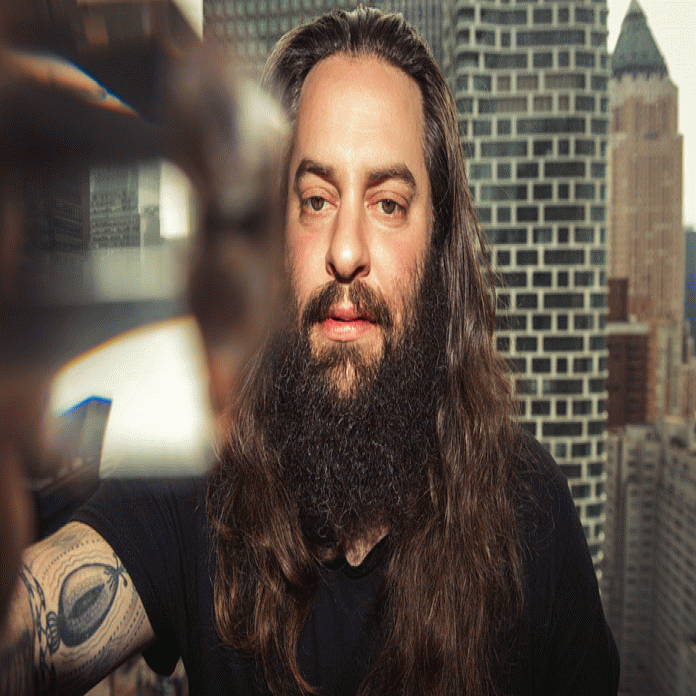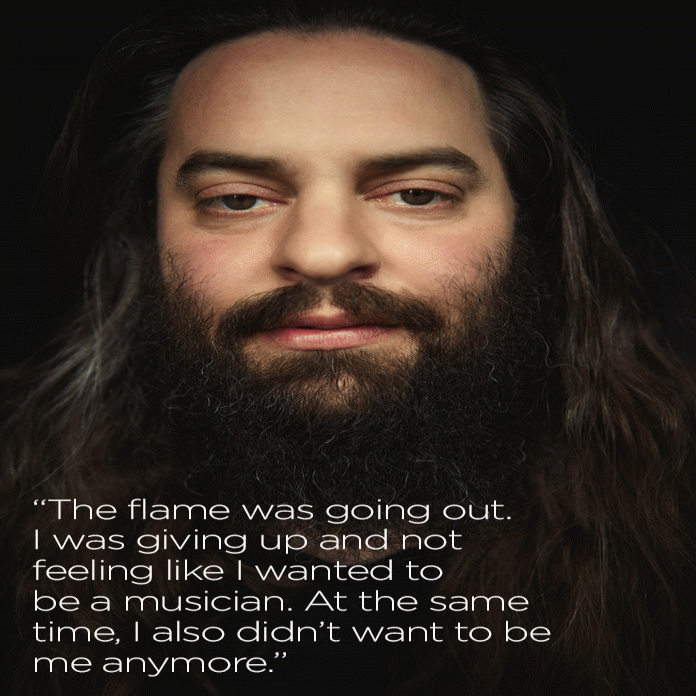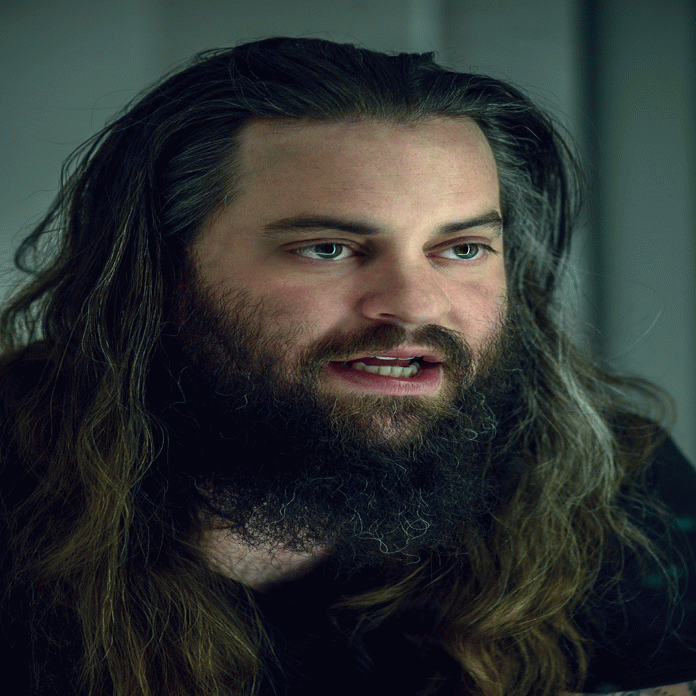
Strand of Oaks on “Eraserland”
Digging Deeper Than Ever
Apr 11, 2019
Photography by Ray Lego (For Under the Radar)
Web Exclusive
![]()
For just a moment, Strand of Oaks’ Timothy Showalter got what he wanted.
After years as one of music’s “best kept secrets,” Showalter says he was ready for something bigger. Real money was needed to pay real bills. More than anything, he was ready to craft music for the masses, an artist weary of working so hard only to have a cultural subset listen to each album. Then came 2014’s HEAL.
Years after Showalter’s breakthrough, the Indiana-born/Philadelphia-based singer/songwriter/guitarist says he hit another wall. “I don’t feel it anymore,” he sings as he opens his latest album, Eraserland, a serious sentiment of an artist ready to walk away from it all—including the very platform he sought for so long.
If left to his own devices, Showalter wouldn’t even be here. The creative community around him, led by My Morning Jacket members Carl Broemel, Tom Blankenship, Patrick Hallahan, Bo Koster, and producer Kevin Ratterman, did the heavy lifting on the new recording, giving Showalter a purpose when he was at his lowest point.
We recently sat down with Showalter to discuss the journey between the breakthrough and the near break-up and what he’s learned about his craft in response.

Matt Conner (Under the Radar): You’re swamped for a week of SXSW in Austin and flying back and forth to play Colbert. The frenzied activities of the present seem in stark contrast from what I understand was your mindset or desires before recording Eraserland, where you were ready to throw it all away as Strand of Oaks. I want to talk about now but can you lead us back there first? Was there a moment that best defines what was happening back there?
Timothy Showalter: Yeah, I think there were probably a lot of moments. My first tour was 2004. It took me 10 years in my career to put out a record where people paid attention, which was HEAL. I’d been doing it for a long time, and I was very used to being the guy where people said to me, “Aw man, you’re the best-kept secret.” And I’m like, “I don’t wanna be the best-kept secret. I need to make some money so I can pay the rent.”
Once it happened, I overly defined myself as Strand of Oaks. I went from being a pretty well-rounded human with a lot of interests and friends to surprisingly—and this might happen to a lot of musicians—but the second it started going and the engine really turned on, in 2014 I became so singularly focused on the music. I overly defined myself as a band or a musician, and it worked for a long time.
However, there’s only so much fuel that one has to just make that your whole existence and I really dug into it, this character or just me trying to compensate for being a pretty naturally introverted person. I think all of this is a trained pattern for me to fight off my introverted nature. I think that would shock a lot of people, but I genuinely don’t function great and have a lot of anxiety in traveling and being away from home. I like the quiet. I take a walk every day. It was just a new experience for me to be just everywhere.
Things went well, but then Hard Love came out [in 2017]. I really sank a lot into that record, and it was kind of swept up in this whole thing of being a party record. I think that was a kind of the narrative that ran away from me. I didn’t really start it, but then people started talking and that defined the record that had a lot of meaning to me other than just having a good time. I just felt like it didn’t connect the way I wanted it to.
Part of the reason was I made that record in 2015 and 2016. I was in New York and I went to a Bernie Sanders rally when I was making the record. I was really extremely optimistic when I was making it because I was just envisioning that Bernie’s gonna win or Hillary’s gonna win, and we’re gonna be on the verge of a new age. We’re coming into this evolution as people with eight years of Obama. Not to make it too political, but I had a good feeling like these are golden years coming up. People are gonna rave and party and we’re gonna let our inhibitions go with these hang-ups.
Then everything just went bad. I have kind of a sensitive antennae to vibes, and I just felt like, “Oh my God, it’s all slipping away and all people are defining me as a guy that does drugs and wears the sunglasses and has the cut-offs.” There’s a lot more to me, and I can’t break free of it. I’m playing these songs for a year and I’m getting further and further away from why I wanted to write, and compounded on that is that I was associating it with my band and my music, because that’s how I defined myself. In reality, I was very depressed as a person, but I thought it was my music that was falling apart. I was so narrowly focused that I couldn’t even realize it was me-and not in a dramatic way, not in a flashy, great-bits-for-a-bio way. The flame was going out. I was giving up and not feeling like I wanted to be a musician. At the same time, I also didn’t want to be me anymore.
I think that’s the nature of a lot of the songs before I called the album Eraserland. A lot of the songs kept saying “erase” in it, and my wife pointed that out. She said, “You say erase a lot in this record.” I think that’s a really poignant word for the record and it’s also a scary word because I just wanted to go away. I didn’t want to hear myself playing guitar or sing or f-ing chit-chat with people or any of that. I wasn’t making jokes.
I’m usually kind of a loud, gregarious person. You write a song and I sometimes have to dance around my lyrics. The first lyric in the record is “I don’t feel it anymore,” and that sums it up. It could be seen as a throwaway line, but to me, that’s life or death. If I don’t feel it then I don’t want to do it, and not just music but people and interactions and relationships. That’s what keeps me and most everybody going, and I just didn’t have that anymore.

I’m glad you brought up that first line from “Weird Ways,” because I wanted to ask if that a purposeful statement, on your part, to lead out the album?
Yeah, it was, and the interesting thing is that when I actually got to the place to write the songs, “Weird Ways” was the last song that I wrote. I don’t know why. I always prioritize songs in this weird code that only I get and it absolutely doesn’t make sense to anybody. I wrote “Weird Ways” last, and I didn’t forget about it, but I always underestimated it. I thought other songs were brighter, and it wasn’t until the going to the studio and making the actual record that everybody else convinced me to put “Weird Ways” on the record. I was like, “Why?” But that was one of a hundred billion things that the four members of [My Morning] Jacket, my producer Kevin [Ratterman], and everyone did for the record. The song was really synonymous with the whole process.
You’re referring to the level of involvement on the part of Carl and others?
I didn’t do anything to make the record happen. Every other record, it was me being the loud cheerleader with a megaphone like, “C’mon, let’s do this. I’ll play all the instruments blah blah blah.” I didn’t do anything here. Carl from Jacket wrote me and said, “What are you doing?” And I said, “Nothing. My band broke up, the members that I’d been touring with. I don’t know what I’m going to do.”
Carl started everything. He wrote Patrick, Bo, and Tommy, and booked studio time with Kevin. At that point, I had no songs written, so I was like, “Shit, I have to put something together.” It wasn’t that I wanted to make a record; it was that I was pressured. It was the best kind of pressure. I think because those people involved love me—they’re my friends, first and foremost—I think they kind of understood that, “Well, the best time to get him out of this funk is to make him work and put purpose back in his life.” Then it was my wife who said, “You need to leave the house.”
She forced me to go away and said, “You need to go to Wildwood, New Jersey.” It’s this fantastic beach town. I went there in the wintertime when I was the only person there, so it was perfect for what I need to do. I was completely alone. I got to walk on the beach every day and walk through snow and fog and just get inspired by that, and be alone in this place. I set up a studio and it didn’t instantly start, but I was there for a few weeks and at first indebted to the fact that I need to make a record. I knew I couldn’t show up with perhaps one of the best bands ever with nothing or with bad songs. I need to show up better than I ever have.
I didn’t have any expectations. I was able to step outside of whatever hang-ups I’ve had in the past or expectations or pressure I put on myself. I could just write from a real innocent perspective. I thought I was writing all the songs for them and, because of that, I wrote songs for me and I didn’t know it. In so many of those instances, the songs are 100 percent more real than songs that I’ve written in the past that are extremely autobiographical. I’ve said this before, but sometimes when you write autobiographical songs, they’re from such an intensely emotional place and that emotion inevitably is fleeting. That emotion, the saddest you’ve ever been or the most hurt or the happiest you’ve ever been, doesn’t stay with you forever.
I think a lot of these songs weren’t written around some kind of fleeting, impulsive feeling. They were written at whatever layer falls deeper than that. If you dig to the middle, there’s something real pure down there and I think I found it. Thus I was able to write a lot more honestly and more representative of myself than I thought. Something was telling me a lot of stuff that I didn’t know yet. I know it sounds like a multi-personality thing, but I truly felt that I was in communication with who I should have been at the time. I guess people call that prayer. I don’t believe in that stuff, but it was something. It was meditation perhaps.
When Carl calls you and says, “We’ve booked studio time. Let’s do this.” What keeps you from saying, “Hey man, I appreciate the overture and we’re friends, but go away. I’m not doing it.” Was there a part of you that wanted help in some way?
I never thought about that. I think I did it just because I know I get just one shot at this life and regardless of how little I wanted to play music or change, I think you’re a fucking idiot if you say, “No, I don’t want the best band since Pink Floyd to be my backing band.” And one member is in Pink Floyd by the way, now. This is an opportunity regardless of how it turns out. I loved Hard Love. It was a divisive record. Some people fucking hated it. I’ve also got fans that don’t care about HEAL songs. They just want to hear Hard Love songs.
It’s a divisive record, but I thought when I made that record, “This is the one that’s going to make me big. That’ll level me up or whatever.” That’s a good thing to be ambitious. It’s an incredibly ambitious record but Eraserland, and I’m not saying this just for good print, I don’t need anyone to hear it. Nobody needed to have Eraserland except me, ‘cause I get it. I don’t give a shit if people have it or not.
Also read our recent My Firsts interview with Strand of Oaks.

Support Under the Radar on Patreon.
Current Issue

Issue #72
Apr 19, 2024 Issue #72 - The ‘90s Issue with The Cardigans and Thurston Moore
Most Recent
- Bat For Lashes Shares a Cover of Baauer’s “Home” From Her New Album (News) — Bat For Lashes, Baauer
- Premiere: Veronica Lewis Shares New Single “Disconnected” (News) — Veronica Lewis
- The Decemberists Share New Song “All I Want Is You” (News) — The Decemberists
- Ella McRobb Releases New Single “Slow Motion Heartbreak” (News) — Ella McRobb
- Light Verse (Review) — Iron & Wine

Comments
Submit your comment
April 15th 2019
2:52am
podeis ver mas aqui https://guli.es/